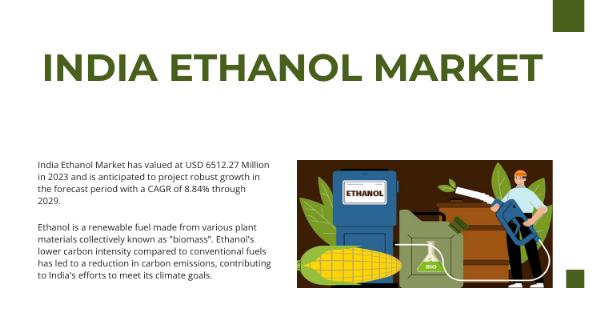Opportunities Abound: Tapping into India's USD 6512.27M Ethanol Market

Strong 8k brings an ultra-HD IPTV experience to your living room and your pocket.
The ethanol industry in India has been gaining momentum in recent years due to various government initiatives aimed at promoting renewable energy sources, reducing dependence on fossil fuels, and addressing environmental concerns. Also, as per the Techsci Research Report- the India Ethanol Market valued at USD 6512.27 Million in 2023 and is anticipated to project robust growth in the forecast period with a CAGR of 8.84% through 2029. Ethanol is a renewable fuel made from various plant materials collectively known as "biomass”.
Here's an overview:
- Government Policies and Initiatives: The Indian government has introduced several policies and incentives to boost the ethanol industry. The Ethanol Blended Petrol (EBP) Program mandates the blending of ethanol with petrol to reduce emissions and promote cleaner fuel usage. Additionally, the National Biofuel Policy sets targets for ethanol blending and provides financial incentives to ethanol producers.
- Ethanol Blending Targets: India has set ambitious targets for ethanol blending with petrol to reduce reliance on fossil fuels and lower carbon emissions. The government aims to achieve 20% ethanol blending with petrol (E20) by 2025 and eventually move towards E20 by 2030.
- Production Capacity: The ethanol production capacity in India has been steadily increasing. Major ethanol producers in India include sugar mills, distilleries, and standalone ethanol plants. The majority of ethanol production is derived from sugarcane molasses, although alternative feedstocks like corn and biomass are also being explored.
- Sugarcane Industry Link: India's ethanol industry is closely linked to the sugarcane industry, as sugarcane molasses is a primary feedstock for ethanol production. The availability and pricing of sugarcane molasses significantly influence ethanol production and blending rates.
- Challenges and Opportunities: Despite the government's support and growing demand for ethanol, the industry faces challenges such as fluctuating feedstock availability, inadequate infrastructure, and policy uncertainties. However, there are significant opportunities for expansion, technological advancements, and diversification of feedstocks to enhance ethanol production in India.
- Environmental and Economic Benefits: Ethanol blending offers environmental benefits by reducing greenhouse gas emissions and air pollution. It also provides economic benefits by generating employment opportunities, enhancing energy security, and reducing the import burden on fossil fuels.
- Research and Development: Research and development efforts are underway to improve ethanol production efficiency, explore alternative feedstocks, and develop advanced technologies such as second-generation (2G) ethanol production from agricultural residues and biomass.
Market research is crucial for setting up an ethanol plant in India for several reasons:
- Understanding Demand Dynamics: Market research helps in understanding the current and future demand for ethanol in India. This includes analyzing factors such as government policies, blending mandates, fuel consumption patterns, and consumer preferences. By understanding demand dynamics, companies can assess the market potential and make informed decisions about capacity planning and investment.
- Assessing Competition: Market research allows companies to identify existing players in the ethanol market, including producers, suppliers, and distributors. Analyzing the competitive landscape helps in understanding market share, pricing strategies, distribution channels, and potential barriers to entry. This information is crucial for developing effective market entry strategies and differentiating the ethanol product offering.
- Identifying Target Markets: Market research helps in identifying target markets and segments for ethanol products. This includes assessing regional demand, industry sectors, and end-user applications such as automotive, industrial, and pharmaceuticals. Understanding target markets enables companies to tailor their marketing and distribution strategies to meet specific customer needs and preferences.
- Evaluating Feedstock Availability: Ethanol production relies on feedstocks such as sugarcane molasses, corn, biomass, and agricultural residues. Market research helps in evaluating the availability, pricing, and sustainability of feedstock sources in different regions of India. This information is essential for securing reliable feedstock supply chains and optimizing production costs.
- Assessing Regulatory Environment: Market research helps in understanding the regulatory environment governing ethanol production, blending, taxation, and subsidies in India. This includes analyzing government policies, incentives, compliance requirements, and market entry barriers. Understanding the regulatory landscape helps in mitigating risks and ensuring compliance with relevant laws and regulations.
- Risk Assessment: Market research enables companies to assess market risks such as volatility in feedstock prices, changes in government policies, geopolitical factors, and environmental regulations. By identifying potential risks and uncertainties, companies can develop risk management strategies and contingency plans to mitigate adverse impacts on ethanol plant operations and profitability.
-
Financial Viability: Market research is essential for assessing the financial viability of ethanol plant investments. This includes analyzing capital expenditure, operating costs, revenue projections, and return on investment (ROI) calculations. By conducting thorough market research, companies can make informed decisions about investment feasibility, financing options, and potential revenue streams with the assistance of market research for India ethanol market.
Advantages of setting up an ethanol plant in India.
Here are some key advantages:
- Government Incentives: The Indian government provides various incentives and subsidies to promote ethanol production, including financial support, tax benefits, and procurement guarantees. These incentives help reduce the initial investment cost and improve the viability of ethanol projects.
- Ethanol Blending Mandates: The Indian government has mandated the blending of ethanol with petrol to reduce emissions and promote cleaner fuel usage. Setting up an ethanol plant enables companies to participate in the ethanol blending program and comply with blending targets, thus ensuring a steady market for ethanol production.
- Diversification of Revenue Streams: For industries such as sugar mills and distilleries, setting up an ethanol plant allows for diversification of revenue streams. Instead of solely relying on traditional products like sugar or spirits, companies can generate additional income through ethanol production.
- Job Creation and Rural Development: Ethanol production creates employment opportunities, particularly in rural areas where feedstocks like sugarcane are grown. Setting up ethanol plants can contribute to rural development by providing jobs and boosting local economies.
- Energy Security: Ethanol production reduces dependence on imported fossil fuels, enhancing energy security for the country. By utilizing domestic feedstocks like sugarcane molasses or agricultural residues, ethanol plants contribute to reducing India's reliance on foreign oil imports.
- Environmental Benefits: Ethanol is a renewable and cleaner-burning fuel compared to traditional fossil fuels. Its use in blending with petrol reduces greenhouse gas emissions, air pollution, and dependence on non-renewable resources. Setting up ethanol plants aligns with India's environmental goals and commitments to combat climate change.
- Market Potential: With increasing awareness about environmental sustainability and growing demand for cleaner fuels, the market potential for ethanol in India is significant. Setting up ethanol plants positions companies to capitalize on this growing market and benefit from the increasing demand for ethanol.
- Technological Advancements: Setting up new ethanol plants allows companies to leverage advancements in technology for ethanol production. This includes improvements in feedstock processing, fermentation processes, and utilization of second-generation (2G) feedstocks, leading to higher efficiency and lower production costs.
Note: IndiBlogHub features both user-submitted and editorial content. We do not verify third-party contributions. Read our Disclaimer and Privacy Policyfor details.




![Airbags and Seatbelts Market Growth Forecast: USD 38.16 Billion [USD 38.16 Billion], Projected 7.10% CAGR to 2029](https://indibloghub.com/public/images/courses/67736d4bb9d96584_1735617867.png)


![Vegan Cheese Market Share & Trends: Projected to Reach USD 2.59 Billion [CAGR: 12.7%]](https://indibloghub.com/public/images/courses/675681543c2084383_1733722452.png)